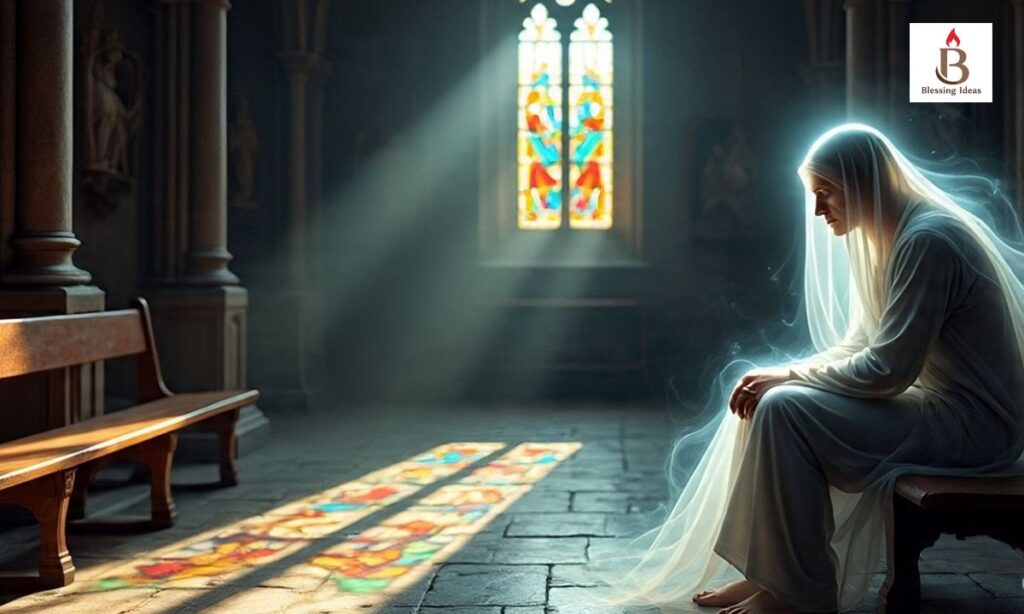Have you ever awakened from a dream featuring a ghost, feeling unsettled and searching for answers? In 2025, as spiritual awareness continues to grow, many believers are seeking biblical understanding of their supernatural dream experiences.
Dreams involving ghosts can be particularly mysterious, leaving us wondering if there’s a deeper spiritual message or if it’s simply our subconscious mind at work. From a biblical perspective, these dreams often carry significant spiritual meaning that can guide our faith journey and personal growth.
Understanding Ghosts in Biblical Context
The Bible doesn’t use the word “ghost” in the contemporary sense we understand today. Instead, scripture speaks of various types of spirits and spiritual beings that interact with the physical world.
In biblical times, the concept of spirits was well-established, but it differed significantly from modern ghost stories or paranormal activities. The Bible presents a clear framework for understanding spiritual beings and their interactions with humanity.
Scripture distinguishes between different types of spiritual entities: the Holy Spirit of God, human spirits (both living and deceased), and evil spirits or demons. Each category serves different purposes in God’s divine plan and spiritual economy.
Understanding these distinctions helps us properly interpret dreams involving ghostly figures, ensuring we align our interpretation with biblical truth rather than cultural superstitions.
The Bible and Spirits: What’s the Difference?
The Bible presents several categories of spirits that appear throughout scripture:
The Holy Spirit is God’s presence and power working in believers’ lives. John 14:26 states: “But the Helper, the Holy Spirit, whom the Father will send in My name, He will teach you all things and bring to your remembrance all things that I said to you.”
Human spirits refer to the spiritual essence of people, both living and deceased. Ecclesiastes 12:7 explains: “Then the dust will return to the earth as it was, and the spirit will return to God who gave it.”
Evil spirits are demonic entities that oppose God’s will. Mark 1:23-26 describes Jesus casting out an unclean spirit from a man in the synagogue.
These biblical distinctions help us understand that not all spiritual encounters in dreams come from the same source. Discernment is crucial when interpreting ghostly dream experiences.
Ghosts in Dreams: What Does the Bible Say?
Scripture doesn’t explicitly discuss “ghosts” in dreams, but it provides extensive guidance on dream interpretation and spiritual discernment. The Bible treats dreams as potential vehicles for divine communication.
Numbers 12:6 reveals God’s method: “If there is a prophet among you, I, the Lord, make Myself known to him in a vision; I speak to him in a dream.” This establishes dreams as legitimate channels for spiritual messages.
However, the Bible also warns about deceptive spiritual experiences. 1 John 4:1 instructs: “Beloved, do not believe every spirit, but test the spirits, whether they are of God.”
When ghostly figures appear in dreams, we must evaluate them against biblical truth, considering the dream’s content, emotional impact, and alignment with God’s character and Word.
The Role of Dreams in the Bible
Throughout scripture, dreams served as important communication tools between God and His people. Many pivotal moments in biblical history involved divine dreams and their interpretations.
Joseph’s prophetic dreams in Genesis 37:5-11 revealed God’s future plans for his life and family, despite initial misunderstanding from his brothers.
Daniel’s gift of dream interpretation helped him serve foreign kings while maintaining his faith. Daniel 2:28 declares: “But there is a God in heaven who reveals secrets, and He has made known to King Nebuchadnezzar what will be in the latter days.”
Solomon’s dream encounter with God in 1 Kings 3:5 led to his famous request for wisdom: “Give to Your servant an understanding heart to judge Your people, that I may discern between good and evil.”
These examples demonstrate that God actively uses dreams to communicate His will, provide guidance, and reveal future events to those who seek Him.
Biblical Interpretation of Ghosts in Dreams
When interpreting ghostly dreams from a biblical perspective, several principles guide our understanding:
Spiritual warnings or messages may come through dreams involving spiritual beings. The account in 1 Samuel 28:3-20, where Samuel’s spirit appears to warn Saul, illustrates how deceased individuals might convey divine messages.
Testing spiritual sources remains crucial. Not every spiritual dream comes from God. Deuteronomy 13:1-3 warns: “If there arises among you a prophet or a dreamer of dreams… you shall not listen to the words of that prophet or that dreamer of dreams.”
Symbolic representation often characterizes biblical dreams. Ghostly figures might symbolize unresolved issues, spiritual battles, or calls to repentance rather than literal appearances of the deceased.
Divine comfort may come through dreams of departed loved ones, providing peace during grief while not necessarily indicating actual visitation from the dead.
Do Ghosts in Dreams Represent the Dead?
The Bible presents a complex view of death and the afterlife that impacts how we interpret ghostly dreams. Scripture teaches that upon death, souls enter their eternal state, either with God or separated from Him.
Luke 16:19-31 describes the parable of Lazarus and the rich man, showing a great gulf between the living and dead that cannot be crossed. This suggests that actual visitation from deceased individuals is unlikely.
Hebrews 9:27 states: “It is appointed for men to die once, but after this the judgment.” This indicates that death is final, and the deceased don’t return to interact with the living.
Ecclesiastes 9:5-6 adds: “For the living know that they will die; but the dead know nothing… their love, their hatred, and their envy have now perished.”
Therefore, dreams of deceased individuals likely represent symbolic messages, unresolved grief, or spiritual reflections rather than actual visits from the dead.
Common Biblical Themes Associated with Ghosts in Dreams

Several recurring biblical themes emerge when interpreting ghostly dreams:
Spiritual Warfare: Good vs. Evil
Dreams involving ghosts often reflect the ongoing spiritual battle between good and evil forces. Ephesians 6:12 reminds us: “For we do not wrestle against flesh and blood, but against principalities, against powers, against the rulers of the darkness of this age.”
These dreams might indicate:
- Spiritual attacks requiring prayer and protection
- The need for stronger spiritual armor
- Calls to engage in spiritual warfare through intercession
- Recognition of spiritual opposition in your life
Repentance and Forgiveness
Ghostly dreams frequently highlight areas needing repentance or forgiveness. Like Saul’s encounter with Samuel’s spirit, these dreams may confront us with spiritual disobedience or unresolved sin.
1 John 1:9 promises: “If we confess our sins, He is faithful and just to forgive us our sins and to cleanse us from all unrighteousness.”
These dreams might signal:
- Unconfessed sin requiring repentance
- Broken relationships needing reconciliation
- Guilt from past actions seeking resolution
- God’s call to forgive others who have wronged you
Comfort or Confrontation
Dreams of deceased loved ones or spiritual beings can provide either comfort during difficult times or confrontation regarding spiritual matters needing attention.
2 Corinthians 1:3-4 speaks of God as “the Father of mercies and God of all comfort, who comforts us in all our tribulation.”
Comforting ghostly dreams might offer:
- Peace during grief and loss
- Assurance of God’s presence
- Closure for unfinished emotional business
- Hope regarding eternal reunion with loved ones
Interpreting the Biblical Meaning of Ghosts in Your Dreams
Proper interpretation of ghostly dreams requires careful consideration of multiple factors, always filtered through biblical truth and spiritual discernment.
Context Matters
Understanding your dream’s context provides crucial interpretive clues:
Personal spiritual condition: Are you currently struggling with specific sins, doubts, or spiritual battles? Dreams often reflect our spiritual state.
Recent life events: Have you experienced loss, trauma, or significant life changes? These circumstances influence dream content and meaning.
Emotional state: Were you fearful, peaceful, curious, or confused in the dream? Emotions provide important interpretive keys.
Dream setting and characters: Where did the dream occur? Who appeared? These details offer symbolic significance.
Common Themes to Look For
Several patterns commonly appear in spiritually significant ghostly dreams:
Fear-inducing encounters might indicate spiritual attack, unconfessed sin, or areas where you need God’s protection and deliverance.
Peaceful interactions could represent divine comfort, spiritual encouragement, or God’s assurance during difficult times.
Warning messages may call attention to spiritual dangers, wrong life directions, or the need for immediate repentance.
Unfinished conversations with deceased individuals might symbolize unresolved grief, guilt, or the need for emotional healing.
Seeking Clarity Through Prayer
James 1:5 encourages believers: “If any of you lacks wisdom, let him ask of God, who gives to all liberally and without reproach, and it will be given to him.”
When seeking dream interpretation:
Pray for discernment before, during, and after analyzing your dream experiences.
Study relevant scripture that relates to your dream’s themes and symbols.
Consult mature believers who can provide wise counsel and spiritual insight.
Test interpretations against biblical truth, ensuring they align with God’s character and Word.
When Ghost Dreams Are Not Biblical

Not every dream featuring ghosts carries spiritual significance. Several factors can produce ghostly dreams without divine involvement:
Cultural influences from movies, books, or stories about ghosts can infiltrate our subconscious and create non-spiritual dream content.
Psychological factors such as anxiety, depression, unresolved trauma, or stress can manifest as ghostly dream figures without spiritual meaning.
Physical causes including medications, illness, sleep disorders, or dietary factors can trigger unusual dreams that aren’t spiritually significant.
Demonic deception can create false spiritual experiences designed to mislead believers or create fear and confusion.
1 Thessalonians 5:21 instructs: “Test all things; hold fast what is good.” This applies to dream interpretation as well as other spiritual experiences.
Conclusion
Dreams featuring ghosts or spiritual beings can carry profound biblical meaning when properly interpreted through scripture and spiritual discernment. As we navigate 2025’s spiritual landscape, understanding these experiences helps us grow in faith and spiritual maturity.
Whether serving as warnings, comfort, calls to repentance, or reminders of spiritual warfare, ghostly dreams deserve careful consideration and prayer. Proverbs 27:14 reminds us: “Iron sharpens iron, so a man sharpens the countenance of his friend” – sometimes God uses other believers to help interpret our spiritual experiences.






